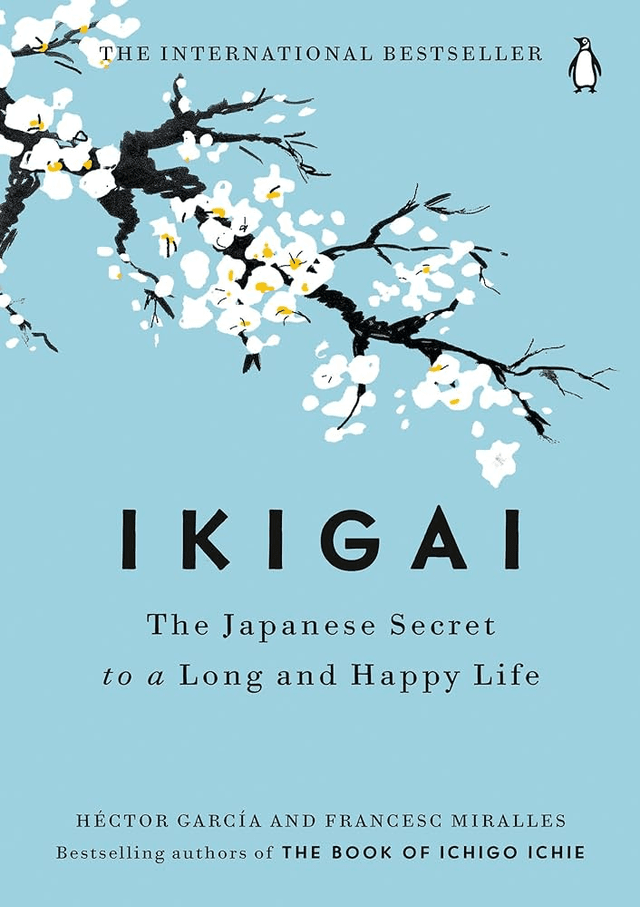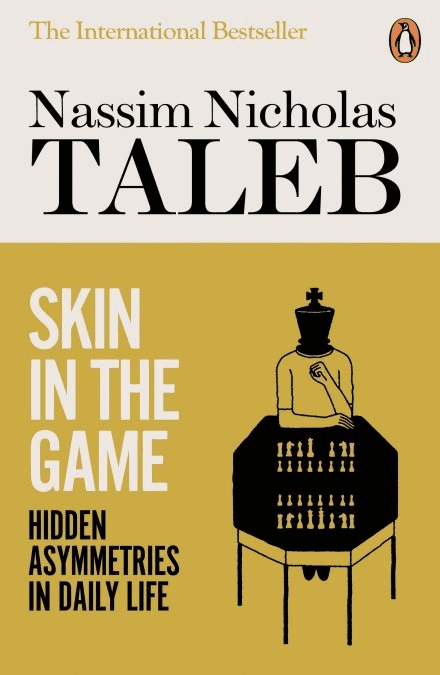Ikigai: The Japanese Secret to a Long and Happy Life vs. Skin in the Game: Hidden Asymmetries in Daily Life
Ikigai: The Japanese Secret to a Long and Happy Life
Discover the secrets to a long, healthy, and fulfilling life with "Ikigai: The Japanese Secret to a Long and Happy Life" by Héctor García and Francesc Miralles. This insightful book delves into the Japanese concept of ikigai, or a "reason for being," which is believed to be a key factor in the remarkable longevity of the residents of Okinawa, a Japanese village known for having the world’s highest percentage of centenarians. Through interviews with these vibrant centenarians, the authors uncover how the principles of ikigai—where passion, mission, vocation, and profession intersect—contribute to their happiness and longevity. The book reveals the residents' daily practices, from their nutrient-rich diets and active lifestyles to their strong community bonds and purposeful work. "Ikigai" provides practical advice and tools to help readers discover their own ikigai, offering a blend of cultural wisdom and actionable steps towards a life filled with purpose, health, and joy. This bo...
Skin in the Game: Hidden Asymmetries in Daily Life
Skin in the Game: Hidden Asymmetries in Daily Life is a nonfiction book by Nassim Nicholas Taleb, published in 2018. Taleb’s main point is pretty simple: people should share in the risks of the decisions they make. If you benefit from something, you should also face the downsides if things go wrong. He calls this having “skin in the game.” Without that, people can make reckless choices that hurt others while staying safe themselves. The book covers everything from politics and business to religion and everyday life. Taleb doesn’t hold back on criticism. He talks about how some policymakers and financial experts make decisions that affect millions but don’t suffer when those decisions backfire. He uses examples like bankers profiting during booms but getting bailed out during crashes. Taleb also goes after what he calls “Intellectual Yet Idiot” types—educated people who, in his view, complicate things and give advice without understanding real-world consequences. He argues that real k...


Reviews
Reviews
| Item | Votes | Upvote |
|---|---|---|
| Engaging and accessible writing style | 1 | |
| Motivating and thought-provoking | 1 | |
| Provides actionable advice on living a healthier life | 1 |
| Item | Votes | Upvote |
|---|---|---|
| A lack of cited sources and references to back up claims | 1 | |
| Certain concepts and advice may seem repetitive | 1 | |
| Sometimes unfocused and strays from the main theme | 1 |
| Item | Votes | Upvote |
|---|---|---|
| Insightful and provocative arguments | 1 | |
| Applies to various aspects of life | 1 | |
| Engaging and accessible writing style | 1 | |
| A sensible approach to ethics | 1 |
| Item | Votes | Upvote |
|---|---|---|
| Some arguments can be repetitive | 1 | |
| Taleb's confrontational tone may not appeal to everyone | 1 |
Frequently Asked Questions
'Ikigai' focuses on finding purpose and enhancing well-being through cultural wisdom and actionable advice, making it ideal for readers seeking a fulfilling life. In contrast, 'Skin in the Game' emphasizes the importance of personal risk and accountability in decision-making, appealing to those interested in ethics and fairness. The choice depends on whether you prefer a holistic approach to happiness or a critical examination of ethics in daily life.
'Ikigai' provides practical tools and advice aimed at enhancing health and happiness through the concept of finding one's purpose. It includes daily practices that readers can implement. On the other hand, 'Skin in the Game' offers insights into ethical decision-making and accountability but is less focused on direct actionable steps for personal improvement. Therefore, 'Ikigai' may be more beneficial for those looking for specific actions to improve their daily lives.
Both books feature engaging and accessible writing styles, making complex ideas easier to understand. However, 'Ikigai' tends to be more motivational and uplifting, while 'Skin in the Game' may come across as confrontational due to Taleb's tone. Readers may prefer one style over the other based on their personal taste.
'Skin in the Game' directly addresses the concept of risk by discussing the importance of having a personal stake in outcomes, making it more effective in this regard. 'Ikigai' does touch on risk indirectly through the pursuit of a fulfilling life, but it is not the central theme. Therefore, for a deeper exploration of risk and accountability, 'Skin in the Game' is the better choice.
'Ikigai: The Japanese Secret to a Long and Happy Life' by Héctor García and Francesc Miralles explores the Japanese concept of ikigai, or 'reason for being.' The book examines how this principle contributes to the remarkable longevity and happiness of the residents of Okinawa, a Japanese village known for its high percentage of centenarians. Through interviews with these centenarians, the authors reveal how practices such as nutrient-rich diets, active lifestyles, strong community bonds, and purposeful work contribute to their well-being. The book offers practical advice and tools to help readers discover their own ikigai and enhance their lives.
Pros of 'Ikigai: The Japanese Secret to a Long and Happy Life' include its engaging and accessible writing style, its motivating and thought-provoking content, and the actionable advice it provides on living a healthier life. However, some cons include a lack of cited sources and references to back up claims, certain concepts and advice that may seem repetitive, and moments where the book sometimes feels unfocused and strays from the main theme.
'Ikigai: The Japanese Secret to a Long and Happy Life' is written by Héctor García and Francesc Miralles. Héctor García is a Spanish author who has lived in Japan for many years and writes about Japanese culture. Francesc Miralles is a Spanish author and journalist specializing in psychology and spirituality.
'Ikigai: The Japanese Secret to a Long and Happy Life' offers practical advice and tools to help readers discover their own ikigai. This includes guidance on aligning passion, mission, vocation, and profession to find deeper satisfaction in everyday life. The book also shares insights into maintaining a nutrient-rich diet, leading an active lifestyle, fostering strong community bonds, and engaging in purposeful work.
'Skin in the Game: Hidden Asymmetries in Daily Life' is a nonfiction book by Nassim Nicholas Taleb that argues people should share in the risks of their decisions. Taleb emphasizes that if someone benefits from a decision, they should also face the potential downsides. The book critiques various sectors, including politics and finance, highlighting how decision-makers often escape the consequences of their actions. It explores themes of accountability and the importance of real-world experience over theoretical knowledge.
Nassim Nicholas Taleb is a Lebanese-American essayist, scholar, and statistician known for his work on risk, uncertainty, and decision-making. He is the author of several influential books, including 'The Black Swan' and 'Antifragile.' Taleb's writing often critiques conventional wisdom and emphasizes the importance of practical experience in understanding complex systems.
Pros of 'Skin in the Game' include its insightful and provocative arguments, applicability to various aspects of life, engaging writing style, and a sensible approach to ethics. However, some cons are that certain arguments can be repetitive, and Taleb's confrontational tone may not appeal to everyone.
The main themes of 'Skin in the Game' include accountability, the importance of sharing risks in decision-making, the critique of policymakers and financial experts who evade consequences, and the influence of stubborn minorities on societal choices. Taleb also discusses the concept of real knowledge being derived from practical experience rather than theoretical understanding.
Nassim Nicholas Taleb's writing style in 'Skin in the Game' is direct and sometimes blunt. He is known for his no-nonsense approach, which some readers appreciate for its clarity and honesty, while others may find it overly combative or confrontational.



















